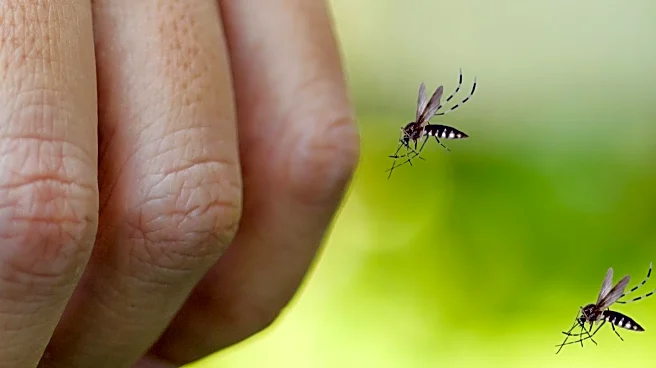What's Happening?
A new species of bacteria from the genus Bartonella has been identified in sand flies within the Amazon National Park in Pará, Brazil. These insects are typically known for transmitting leishmaniasis. The DNA of the newly discovered bacteria is similar to two other Andean species, B. bacilliformis and B. ancashensis, which are known to cause Carrión's disease. Although there is no current evidence that this new species can cause disease in Brazil, further studies are necessary due to the genus's association with various diseases globally. The research was conducted by Marcos Rogério André and Eunice Aparecida Bianchi Galati, affiliated with Brazilian institutions, and supported by FAPESP. The study was published in Acta Tropica, involving multiple researchers.
Why It's Important?
The discovery of a new Bartonella species in Brazil raises concerns about potential health risks, as Bartonella bacteria are known to cause prolonged infections, particularly in individuals with compromised immune systems. This finding could have significant implications for public health, especially in isolated regions with limited access to healthcare. Understanding the prevalence and transmission vectors of Bartonella diseases is crucial for developing effective prevention and treatment strategies. The research highlights the need for increased surveillance and study of these bacteria, which could lead to better management of neglected diseases like cat scratch disease.
What's Next?
Researchers plan to continue their investigations by collecting samples from various biomes to map the presence of Bartonella strains. They aim to identify potential reservoirs by studying the feeding habits of sand flies. Collaboration with healthcare professionals is encouraged to explore the possibility of co-infection with Leishmania and Bartonella in patients with unexplained fevers. Further research could lead to new insights into the transmission and impact of Bartonella diseases, potentially influencing public health policies and practices.
Beyond the Headlines
The discovery of Bartonella bacteria in Brazil could indicate a broader adaptability of these pathogens beyond their known Andean vectors. This adaptability might lead to the emergence of new disease patterns in non-Andean regions, necessitating a reevaluation of current epidemiological models. The study underscores the importance of biodiversity research in understanding disease ecology and the potential for cross-species transmission of pathogens.









